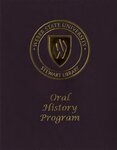| Title |
Stewart, Elizabeth OH4_039 |
| Creator |
Weber State University, Stewart Library: Oral History Program |
| Contributors |
Stewart, Elizabeth, Interviewee; Betz, Allen, Interviewer |
| Collection Name |
Weber State College Oral Histories |
| Description |
The Weber State College Oral History Program was created in the early 1970s to "record and document, through personal reminiscences, the history, growth and development of Weber State College." Through interviews with administrators, faculty and students, the program's goal was to expand the documentary holdings on Weber State College and its predecessor entities. From 1970 to 1976, the program conducted some fifteen interviews, under the direction of, and generally conducted by Harold C. Bateman, an emeritus professor of history. In 1979, under the direction of archivist John Sillito, the program was reestablished and six interviews were conducted between 1979 and 1983. Additional interviews were conducted by members of the Weber State community. |
| Relation |
https://library.weber.edu/collections/oral_history |
| Biographical/Historical Note |
The following includes the transcript and an audio clip from an oral history interview with Elizabeth Stewart. |
| Subject |
Childhood and youth; Universities and colleges; Musical groups; Early-music groups |
| Digital Publisher |
Stewart Library, Weber State University, Ogden, Utah, USA |
| Date |
1974 |
| Date Digital |
2018 |
| Temporal Coverage |
1905; 1906; 1907; 1908; 1909; 1910; 1911; 1912; 1913; 1914; 1915; 1916; 1917; 1918; 1919; 1920; 1921; 1922; 1923; 1924; 1925; 1926; 1927; 1928; 1929; 1930; 1931; 1932; 1933; 1934; 1935; 1936; 1937; 1938; 1939; 1940; 1941; 1942; 1943; 1944; 1945; 1946; 1947; 1948; 1949; 1950; 1951; 1952; 1953; 1954; 1955; 1956; 1957; 1958; 1959; 1960; 1961; 1962; 1963; 1964; 1965; 1966; 1967; 1968; 1969; 1970; 1971; 1972; 1973; 1974 |
| Medium |
oral histories (literary genre) |
| Spatial Coverage |
Ogden, Weber County, Utah, United States, http://sws.geonames.org/11788968, 41.22809, -111.96766 |
| Type |
Text; Sound; Image/StillImage |
| Conversion Specifications |
Sound was recorded with an audio reel-to-reel casette recorder. Reel-to-reel recording was converted to digital file. Transcribed using Express Scribe. Digitally reformatted using Adobe Acrobat XI Pro. |
| Language |
eng |
| Rights |
Materials may be used for non-profit and educational purposes, please credit University Archives, Stewart Library; Weber State University. |
| Source |
Stewart, Elizabeth OH4_039; Weber State University, Stewart Library, University Archives |
| Format |
application/pdf; audio/mpeg |
| ARK |
ark:/87278/s6acjxz2 |
| Setname |
wsu_oh |
| ID |
111906 |
| Reference URL |
https://digital.weber.edu/ark:/87278/s6acjxz2 |
| Title |
Stewart, Elizabeth OH4_039 |
| Creator |
Weber State University, Stewart Library: Oral History Program |
| Contributors |
Stewart, Elizabeth, Interviewee; Betz, Allen, Interviewer |
| Description |
The Weber State College Oral History Program was created in the early 1970s to “record and document, through personal reminiscences, the history, growth and development of Weber State College.” Through interviews with administrators, faculty and students, the program’s goal was to expand the documentary holdings on Weber State College and its predecessor entities. From 1970 to 1976, the program conducted some fifteen interviews, under the direction of, and generally conducted by Harold C. Bateman, an emeritus professor of history. In 1979, under the direction of archivist John Sillito, the program was reestablished and six interviews were conducted between 1979 and 1983. Additional interviews were conducted by members of the Weber State community. |
| Relation |
https://library.weber.edu/collections/oral_history |
| Biographical/Historical Note |
The following is an interview with Elizabeth Stewart, conducted by Allen Betz on August 30, 1974. Stewart discusses her childhood in Ogden and her experiences with music groups, specificlaly the Utah Symphony, in Utah. |
| Subject |
Childhood and youth; Universities and colleges; Musical groups; Early-music groups |
| Digital Publisher |
Stewart Library, Weber State University, Ogden, Utah, USA |
| Date |
1974 |
| Date Digital |
2018 |
| Temporal Coverage |
1905-1974 |
| Medium |
oral histories (literary genre) |
| Spatial Coverage |
Ogden, Weber County, Utah, United States, http://sws.geonames.org/11788968, 41.22809, -111.96766 |
| Type |
Text; Sound; Image |
| Conversion Specifications |
Sound was recorded with an audio reel-to-reel casette recorder. Reel-to-reel recording was converted to digital file. Transcribed using Express Scribe. Digitally reformatted using Adobe Acrobat XI Pro. |
| Language |
eng |
| Rights |
Materials may be used for non-profit and educational purposes, please credit University Archives, Stewart Library; Weber State University. |
| Source |
Stewart, Elizabeth OH4_039; Weber State University, Stewart Library, University Archives |
| Format |
application/pdf |
| Setname |
wsu_oh |
| ID |
111952 |
| Reference URL |
https://digital.weber.edu/ark:/87278/s6acjxz2/111952 |





